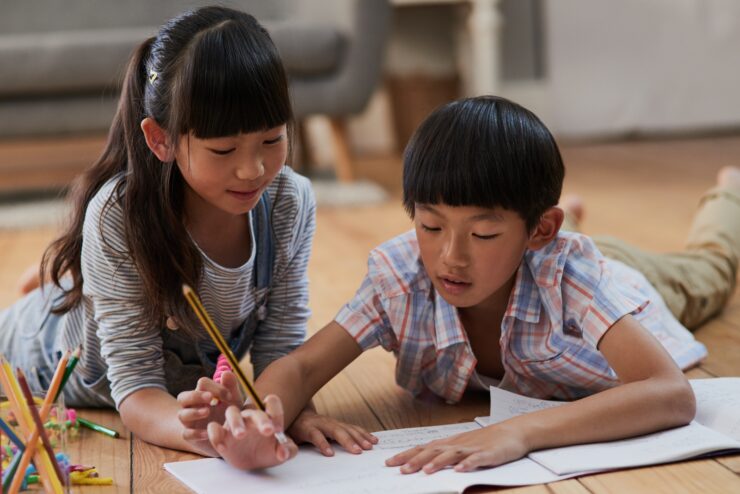Helping children help each other
Adults can guide children to help others in ways that reduce inequality

Jellie Sierksma is trying to understand how to help children behave in ways that reduce inequality and foster social cohesion. Scholars working on prosocial development typically document the positive consequences of prosocial behaviour, like making friends. But Jellie noticed that there is also a darker side, which is often ignored. She tells Annie Brookman-Byrne about her research uncovering the potential negative consequences of children’s prosocial behaviour.
Annie Brookman-Byrne: What kinds of negative consequences do you investigate, and what is your main finding?
Jellie Sierksma: I look at when and how children’s helping behaviours promote negative views of themselves or others, and when and how they perpetuate inequality and hamper learning. As children often help each other, and are eager to do so, it is crucial to understand when help leads to negative consequences and how we might prevent them.
“It is crucial to understand when help leads to negative consequences and how we might prevent them.”
The main finding is that children do not help all peers equally, and their help can perpetuate inequality. The 7- to 9-year-olds in my study provided the least beneficial help to peers who struggled with a task, and the most beneficial help to peers who were already good at that task. In other words, children did not promote learning and skill development in those who needed it the most.
ABB: What can parents and teachers do to encourage children to help each other in a way that promotes more equal outcomes?
JS: Parents often scaffold helping, and schools implement peer helping as a formal learning strategy, for example by assigning collaborative learning exercises. However, both adults and children need to recognize that not all help is equally positive. Parents and teachers should teach children how to help as part of their scaffolding – for example, by not just giving the correct answer, but offering hints.
“Negative consequences often emerge because children associate needing help with being incompetent.”
Negative consequences often emerge because children associate needing help with being incompetent; we should find ways to disrupt that association. One approach is to promote intellectual humility at home and in classrooms – fostering an awareness that there are limits to our own knowledge, and an appreciation of other people’s expertise. Some really interesting research suggests that intellectually humble children are more likely to seek help while learning. Mastery-oriented teaching practices – those that emphasize learning and growth – can promote intellectual humility.
ABB: Has working on this topic changed anything in your personal or professional life?
JS: Yes! I have two children, aged 3 and 9, and I try to pause and take a breath every time I’m tempted to step in and help. I have learned that I need to let them struggle, giving them time to figure things out by themselves. The aim is not only for my children to learn new skills, but also for them to understand that I believe they are competent and able to accomplish a task. Sometimes this is very easy, as 3-year-olds tend to reject help (“I want to do it by myself!” he often says). But at other times, it is hard because I am in a hurry or just feel bad for them. I try to be open about my own mistakes and talk about the times when I have needed help, pointing out that seeking help is an indication that you want to learn rather than a sign of failure.
This work has also opened up many new research avenues for me. I have become very interested in the psychological impact of educational practices, in particular those that involve unequal and group-based help. One example is educational differentiation such as ability grouping, which is common in many places around the world. This typically means providing additional instruction for low-ability groups, and while this is intended to reduce achievement inequality, it leads to unequal group-based help and may foster negative self-views and stereotypes. I want to gain a better understanding of when differentiation is and is not effective, and how we can improve it.
Footnotes
Jellie Sierksma is an Assistant Professor in the Department of Developmental Psychology at Utrecht University. Her research focuses on children’s prosocial behavior and the development of prejudice, and addresses pressing social problems related to inequality and discrimination. She takes an interdisciplinary approach and uses behavioral experimental designs that capture how children’s social environments (i.e., school, home, the wider society they live in) shape their social cognition and behavior.
Jellie’s website
Jellie on LinkedIn, and on X
Jellie Sierksma contributed to a special collection on understanding and addressing inequality in education in the journal npj Science of Learning. This interview is part of a series dedicated to sharing practical takeaways and personal insights from authors.
The interview has been edited for clarity.


